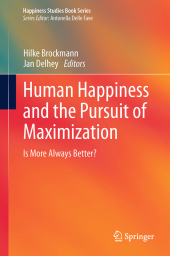 Neuerscheinungen 2015Stand: 2020-02-01 |
Schnellsuche
ISBN/Stichwort/Autor
|
Herderstraße 10
10625 Berlin
Tel.: 030 315 714 16
Fax 030 315 714 14
info@buchspektrum.de |

Hilke Brockmann, Jan Delhey
(Beteiligte)
Human Happiness and the Pursuit of Maximization
Is More Always Better?
Herausgegeben von Brockmann, Hilke; Delhey, Jan
Softcover reprint of the original 1st ed. 2013. 2015. viii, 216 S. 235 mm
Verlag/Jahr: SPRINGER NETHERLANDS; SPRINGER 2015
ISBN: 9400799594 (9400799594)
Neue ISBN: 978-9400799592 (9789400799592)
Preis und Lieferzeit: Bitte klicken
The ubiquitous maximization principle opens up a systematic gateway to the pleasures and pains of contemporary life. Using happiness as a reference point, this book explores the philosophical and empirical limits of the maximization rule.
This book tests the critical potential of happiness research to evaluate contemporary high-performance societies. These societies, defined as affluent capitalist societies, emphasize competition and success both institutionally and culturally. Growing affluence improves life in many ways, for a large number of people. We lead longer, safer, and more comfortable lives than previous generations. But we also live faster, and are competition-toughened, like top athletes. As a result, we suspect limits and detect downsides of our high-speed lives. The ubiquitous maximization principle opens up a systematic gateway to the pleasures and pains of contemporary life. Using happiness as a reference point, this book explores the philosophical and empirical limits of the maximization rule. It considers the answer to questions such as: Precisely, why did the idea of (economic) maximization gain so much ground in our Western way of thinking? When, and in which life domains, does maximization work, when does it fail? When do qualities and when do quantities matter? Does maximization yield a different (un)happiness dividend in different species, cultures, and societies? _
Chapter 1. Is More Always Better? An Introduction; Hilke Brockmann and Jan Delhey.- Chapter 2. When the Pursuit of More Backfires - The American Experiment; Peter Whybrow.- Chapter 3. More Nonsense and Less Happiness: The Uninteded Effects of Artificial Competitions; Mathias Binswanger.- Chapter 4. Happiness by Maximization?; Kurt Bayertz.- Chapter 5. Maximization and the Good; Valerie Tiberius.- Chapter 6. How Wise is Mother Nature? Maximization, Optimization and Short-Sighted Resource Use in Biological Evolution; Hanna Kokko.- Chapter 7. Towards a Neuroscience of Well-being - Implications of Insights from Pleasure Research; Kent C. Berridge and Morten L. Kringelbach.- Chapter 8. From Treating Mental Dysfunction to Neuroenhancement; Michael Koch.- Chapter 9. Do Aspirations and Adaptation Impede the Maximization of Happiness?; Ulrich Schimmack and Hyunji Kim.- Chapter 10. My Car is Bigger than Yours. Consumption, Status Competition, and Happiness in Times of Affluence; Hilke Brockmann and Song Yan.- Chapter 11. Some Lessons from Happiness Economics for Environmental Sustainability; Heinz Welsch.- Chapter 12. Public Policy and Human Happiness: The Welfare State and the Market as Agents of Well-Being; Robert Davidson, Alexander C. Pacek, and Benjamin Radcliff.- Chapter 13 Should the State Care for the Happiness of Its Citizens?; Aloys Prinz.- Chapter 14. A "Happiness Test" for the New Measures of National Well-Being: How Much Better than GDP are they?; Jan Delhey and Christian Kroll.


